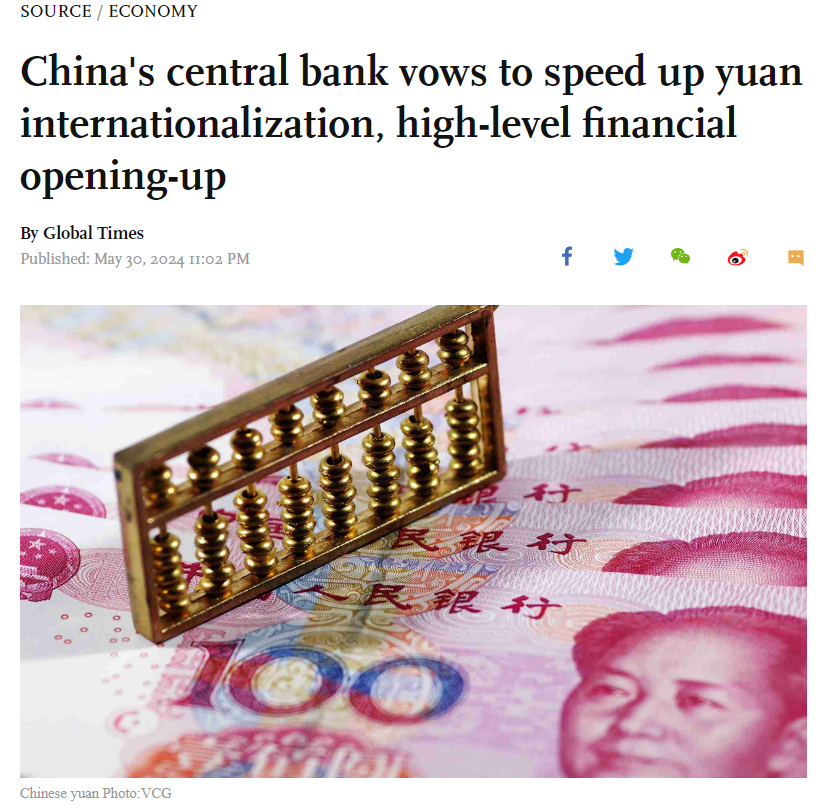LATEST INSIGHTS
Your Present Location: LATEST INSIGHTSZhao Xijun: China's central bank vows to speed up yuan internationalization, high-level financial opening-up
Source: GT Published: 2024-05-30

The People's Bank of China (PBC), the central bank, has vowed to further strengthen coordination between the yuan and foreign currencies and improve basic institutional arrangements for the cross-border use of the yuan, in a bid to accelerate the internationalization of the yuan and enhance the high-level opening-up of the financial sector, according to a report released on the official website of the PBC on Thursday.
The efforts came amid China's vigorous plan to establish itself as a global financial powerhouse, a move that experts say will align with and shore up the high-quality development of the country's real economy. Both endeavors will contribute to the long-term goal of China's comprehensive modernization and its high-quality development across all sectors.
Tao Ling, a vice governor of the PBC, pledged during a media interview to implement sweeping plans, such as enhancing pre-establishment of national treatment alongside a negative list management system, boosting financial services for cross-border business, and actively engaging in global financial governance, to advance high-level financial opening-up, according to the report.
China will expedite the yuan's internationalization by enhancing its cross-border use, bolstering financial infrastructure, and fostering offshore yuan market potential, said Tao, highlighting the yuan's surging international standing and influence in recent years, particularly in global payments, trade financing and foreign exchange transactions.
Despite potential risks and challenges, China remains steadfast in advancing financial reforms and opening-up, demonstrating the government's resolve to accelerate integration into the international financial markets, Xi Junyang, a professor at the Shanghai University of Finance and Economics, told the Global Times on Thursday.
'The efforts send a favorable signal to domestic and international financial practitioners and relevant enterprises, and they will bolster China's financial industry competitiveness while offering overseas players opportunities to access China's vast financial market,' Xi said.
On May 17, China's Hong Kong Monetary Authority announced that the Hong Kong Special Administrative Region will facilitate the creation and use of e-CNY (digital yuan) wallets, marking the latest progress in collaboration with PBC to expand an e-CNY pilot for cross-boundary payments. Experts also view this as a positive outcome in the offshore yuan market's expansion.
In addition, China has ramped up efforts on all fronts to open its door wider for foreign businesses, particularly in the financial sector. The State Council, the cabinet, launched an extensive action plan on February 28. The highlights include expanding access for foreign financial institutions in banking and insurance and broadening their role in the domestic bond market.
China's financial opening-up has been transitioning from a fragmented, piecemeal approach to a more systematic and higher-level institutional way, Xi said. He also stressed the focus on core financial elements in the realization of constructing an open financial system.
According to China's first systemic report on financial policy released on Monday, the country has achieved notable progress in six key financial elements - the internationalization of the yuan, the construction of a modern central bank system, the expansion of financial institutions, the improvement of the modern financial supervision system, the strengthening of a global financial center, and the improvement of financial professionals.
'The internationalization of the yuan is an ongoing process. Our goal is for the yuan to become a widely accepted and used currency by global markets and participants,' Zhao Xijun, co-president of the China Capital Market Research Institute at the Renmin University of China, told the Global Times on Thursday.
China has made significant progress in establishing the yuan's reputation, convenience and relatively stable value, signifying that China is 'well-prepared for integration with the international financial markets.'
Financial opening-up has not eroded but instead improved the resilience of China's risk management capabilities as market players engage more in global competition, Zhao added.























































































 京公网安备 11010802037854号
京公网安备 11010802037854号





